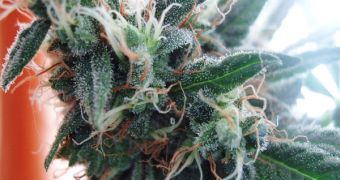The British government has upgraded the risk level of cannabis from a Class C drug to Class B, because of rising consumption problems amongst its youth. Just to be on the safe side, authorities have placed the plant in the same category with codeine and amphetamine, and proponents of the idea say that this will help teenagers and young adults avert the future impact the substance could have on their minds. The active ingredient in cannabis is tetrahydrocannabinol, or THC, a psychoactive molecule that triggers the “high” sensation associated with marijuana.
We will “err on the side of caution and protect the public,” Jacqui Smith, the UK Home secretary, says. The country did not face a cannabis issue until the 1950s, when Indian immigrants introduced it to the poor neighborhoods in which they resided. The hippie movement triggered a drastic increase in marijuana usage around the UK, and authorities previously classified the plant as a Class C risk, alongside anabolic steroids and ketamine.
Until the introduction of the Misuse of Drugs Act of 1971, precious control regulations were applied erratically, and authorities never got a strong and firm hold of the underground drug markets. After '71, the MDA set the basis for the current classification system, and brought forth sanctions for those who trespassed on it. Before this law, global drug usage was ensured by the International Convention on Narcotics Control, adopted in 1928 by the League of Nations at the request of Turkish and Egyptian emissaries. The decision has not been well received by all experts, and some say that there are major drawbacks to the new law.
“Some individuals do get unpleasant mental reactions, but they are relatively small in number. We are not convinced that moving it to Class B with the possibility of five years' imprisonment for possession will have any beneficial effects. There are potential risks of criminalizing people who are using a drug which doesn't harm other people, only themselves. Alcohol is more harmful [than cannabis] – to the population, certainly, and to the individual, possibly,” Advisory Council on the Misuse of Drugs member professor David Nutt argues.
“Nobody is going to be put off smoking cannabis by the decision to reclassify it. It's a decision that has been taken for political reasons, to trump the Tories' law and order agenda, rather than for any scientific reason. Our position is – if cannabis can be dangerous to a few, yet two million people regularly smoke it – we should have a regulated and supervised market for it, rather than putting its distribution in the hands of criminals,” Transform's representative Danny Kushlick adds.
“We remain concerned that the government rejected independent expert advice on cannabis classification – a worrying precedent has been set. There is no evidence that moving the drug to Class B will of itself reduce levels of use, harm or availability, nor is there evidence that the public wants to see tougher penalties for cannabis possession, particularly for young people. Cannabis is a harmful drug and we do need to be vigilant. Using the classification system to 'send out a message' is a blunt and questionable approach, particularly if it risks undermining (...) credibility,” Martin Barnes, of the independent drug charity DrugScope, concludes.

 14 DAY TRIAL //
14 DAY TRIAL //